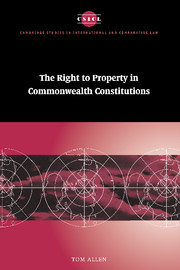Book contents
- Frontmatter
- Contents
- Table of cases
- Acknowledgements
- 1 Introduction
- 2 The right to property at common law
- 3 The development of written rights to property
- 4 Constitutional interpretation
- 5 The meaning of property
- 6 Acquisition and deprivation
- 7 Public purpose
- 8 Compensation
- Bibliography
- Index
- CAMBRIDGE STUDIES IN INTERNATIONAL AND COMPARATIVE LAW
6 - Acquisition and deprivation
Published online by Cambridge University Press: 28 July 2009
- Frontmatter
- Contents
- Table of cases
- Acknowledgements
- 1 Introduction
- 2 The right to property at common law
- 3 The development of written rights to property
- 4 Constitutional interpretation
- 5 The meaning of property
- 6 Acquisition and deprivation
- 7 Public purpose
- 8 Compensation
- Bibliography
- Index
- CAMBRIDGE STUDIES IN INTERNATIONAL AND COMPARATIVE LAW
Summary
Introduction
Commonwealth constitutions do not require compensation for every state action that affects property. Consequently, legislation may affect a great many property owners adversely, but only a small number may be entitled to compensation. However, those that do receive compensation are generally treated quite generously. Accordingly, it is of the greatest importance to determine whether a given interference with property gives rise to a right to compensation. In this century, framers and courts have attempted to develop tests for distinguishing those situations where the state's interference with private property gives rise to a duty to compensate from those where it does not. Finding a test that is both workable and fair is difficult, especially in relation to the regulation of property use, where an owner may suffer an economic loss of the same magnitude as an outright acquisition of part or even all of the property. In such circumstances, the justice of awarding compensation to one person and not to another is difficult to discern.
The first section of this chapter examines the threshold of compensatability. The state cannot afford to compensate in every situation where property rights are affected, and so there must be some minimum level of interference before a claim can be made. Many Commonwealth courts have expressed this idea in some form; indeed, it offers some justification for limiting the right to compensation to interests in property rather than any economic interest. The difficulty is defining the minimum level of interference.
- Type
- Chapter
- Information
- The Right to Property in Commonwealth Constitutions , pp. 162 - 200Publisher: Cambridge University PressPrint publication year: 2000

